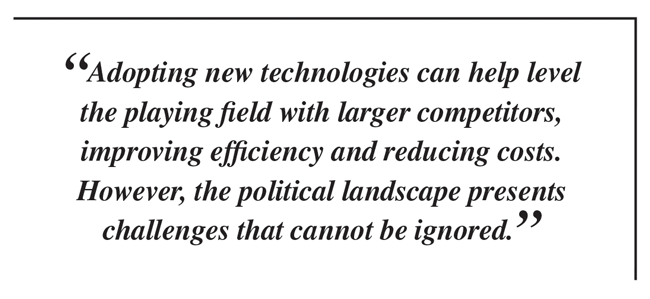
Technology And Politics Intersecting To Shape Outlook For Oil And Gas
As we approach the 2024 presidential election, the stakes for the oil and gas industry have never been higher. For independent operators, combining rapidly evolving technology and shifting political landscapes presents opportunities and challenges. Independent operators, the backbone of American oil and gas, watch closely as policy discussions heat up. The future of our industry may well depend on the outcome of this election, and it is crucial to understand how the intersection of technology and politics shapes that future.
Technology is transforming the oil and gas sector at a breakneck pace, and staying ahead of the curve is essential for continued success. Although independent operators are known for embracing new technology, many lack the deep pockets necessary to absorb the costs of trial-and-error experimentation with cutting-edge solutions, especially when traditional methods continue to work well. The good news is that technology continues to become more accessible, and many innovations can enhance the smaller operations’ productivity.
One of the most significant advancements in recent years is the rise of automation and artificial intelligence. Automation in oil and gas is no longer limited to large operations. AI-driven predictive maintenance, for instance, is helping independent operators reduce downtime by identifying potential equipment failures before they happen. This technology minimizes the need for costly repairs and ensures that wells continue producing without interruption.
Similarly, using drones for monitoring and inspecting well sites reduces the need for manual, labor-intensive fieldwork. Drones equipped with high-resolution cameras and thermal imaging can detect issues such as leaks or equipment malfunctions in real time, enabling operators to address problems more efficiently. These tools are game-changers for smaller independents with limited personnel, offering a cost-effective way to ensure safety and compliance.
Another area where technology is making a significant impact is data analytics. The ability to collect and analyze vast amounts of data from various sources—ranging from geological surveys to production data—allows operators to make informed decisions about drilling locations and production strategies. By leveraging big data, independent operators can maximize their resources and stay competitive in an increasingly crowded marketplace.
Although hydraulic fracturing is a technology that goes back more than 80 years, enhancements and improvements also continue in stimulation effectiveness and optimization. These advances are critical for smaller companies seeking to improve recovery rates while controlling costs.
While technological advancements offer a path to efficiency and profitability, the political landscape presents the oil and gas industry with a complex and uncertain future. The upcoming presidential election is shaping up to be a critical juncture for the sector, and independent operators are paying close attention to the candidates’ policy proposals.
On one side, we have a growing push for renewable energy and a move away from fossil fuels. The current presidential administration has made it clear that addressing climate change is a top priority, and this focus has led to a series of regulatory measures that aim to curb oil and gas production. From limiting drilling permits on federal lands to increasing environmental compliance standards, the Biden administration has taken a tough stance on fossil fuels.
The good news for independent operators is that some candidates express strong opposition to these policies, including the Republican presidential nominee. Many in the GOP advocate for a return to policies that favor oil and gas production, emphasizing the importance of energy independence and national security. Deregulation, increased access to federal lands, and tax incentives for domestic production are critical components of a sensible oil and gas platform.
As we head into the election, it is clear that the industry’s future can go one of two ways. A win for the Democrats may mean continued restrictions and an accelerated push toward renewable energy. A Republican victory, on the other hand, probably will result in a more favorable regulatory environment for independent operators, with an emphasis on domestic production and energy security.
As we look to the future, it is clear that both technology and politics will play crucial roles in shaping the oil and gas industry’s trajectory. For independent operators, this is a time of both opportunity and uncertainty. Adopting new technologies can help level the playing field with larger competitors, improving efficiency and reducing costs. However, the political landscape presents challenges that cannot be ignored.
The 2024 presidential election will be a pivotal moment for the oil and gas sector, and independent operators must be prepared to navigate possible future changes. By staying informed and adopting new technologies, operators can help secure a future where oil and gas remain integral to America’s energy strategy.

Jeremy Viscomi is a strategic marketing expert for the oil and gas industry. Among his many roles, he serves as the Mid-Continent regional lead for the Petroleum Technology Transfer Council, providing independent operators with access to emerging technology aimed at reducing risk and growing profits.
For other great articles about exploration, drilling, completions and production, subscribe to The American Oil & Gas Reporter and bookmark www.aogr.com.
















